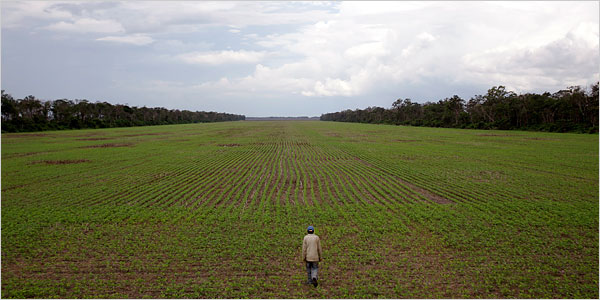Bolivia’s Leader Says States’ Dispute Can Be Resolved
Published: December 20, 2007 - NY Times

(
Above) A soy field in the Bolivian province of Santa Cruz.
Leaders of Bolivia’s
four eastern provinces, where most of the country’s natural gas and
food are produced, are seeking greater autonomy. Photo:
Roberto Candia/Associated Press
By SIMON ROMERO
LA PAZ, Bolivia — At 6 a.m. in this city 11,900 feet above sea level, the corridors of the presidential palace are bitingly cold. Aides huddle in overcoats near space heaters. Soldiers clasping rifles with bayonets stand guard with chattering teeth.
This is when President Evo Morales starts his days, which have become filled with tension recently as the eastern region of this country — the hot lowlands — puts in motion a process to seek far greater autonomy from his government.
Yet just days after putting the armed forces on alert, Mr. Morales said in an interview on Wednesday that he believed it was possible to negotiate a solution to the impasse that would preclude using troops or declaring a state of emergency.
However, Mr. Morales said that he expected the Bolivian people to "mobilize" en masse to react if the four provinces of eastern Bolivia went further and declared their independence.
"I only believe in the consciousness of the people," he said, without elaborating on how such a reaction would play out, before taking a more conciliatory tone.
"We want a frank, sincere discussion on all the issues," said Mr. Morales, explaining his differences with the four provinces, where officials approved statutes last week that would give them control over petroleum royalties and other functions, such as creating their own police forces.
The dispute with eastern Bolivia, where most of the country’s natural gas and food are produced, is the most pressing crisis of his presidency. Mr. Morales, a member of the Aymara ethnic group who is Bolivia’s first indigenous president, acknowledged that the dispute had intensified after his supporters approved a controversial draft constitution.
Still, Mr. Morales said he believed that the constitution, which would bolster indigenous rights and dismantle large landholdings in eastern Bolivia, was legitimately approved despite a boycott of the vote by the political opposition and the abrupt transfer of the constitutional assembly to Oruro, a Morales bastion in the western highlands.
The constitution, Mr. Morales said, still had to be submitted to a national referendum, giving those opposing it a chance to vote against adopting it. However, he described as "illegal" the competing statutes approved in the four eastern provinces, Beni, Pando, Santa Cruz and Tarija.
The dispute has revealed increasing tension between Mr. Morales’s government, which promotes a vision of greater state control of the economy and receives assistance on the order of $100 million a year from Venezuela, and the relatively prosperous eastern provinces, which have thriving export-oriented agricultural and energy industries.
"Evo has an idea of this country that does not coincide with ours," Branko Marinkovic, the president of the Pro-Santa Cruz Committee, an influential political group in the eastern lowlands, said in an interview. "I don’t know if he understands the kind of instability his constitution would create if it becomes law."
Illustrating the divide that must be crossed for negotiation to be possible, Mr. Morales and political leaders like Mr. Marinkovic clearly have little regard for each other. "He doesn’t want to give anything up," the president said of Mr. Marinkovic, one of Bolivia’s wealthiest men, with large soybean-processing and cattle-ranching holdings.
Wearing a tailored suit with an indigenous motif (tie-less, as is the custom in his government), Mr. Morales began the interview at 6 a.m. Sitting in an ornate receiving room in the presidential palace, he discussed the resonances of being president of Bolivia, where more than 60 percent of the population is indigenous.
"Before, this palace was a place of business for the oligarchies," said Mr. Morales, 48, who was a leader of coca growers in the tropical Chapare region before his election as president two years ago. "Now that they don’t have the central government at their disposal, they want something else."
The self-rule statutes in the eastern states, which still face approval in their own referendums, fall short of declaring independence. Nevertheless, a confrontation seems likely.
In the interview at Palacio Quemado, Mr. Morales sounded as if he wanted to avoid a showdown. Still, he had harsh words for the United States, which provides Bolivia with more than $100 million in development and antinarcotics aid each year.
Mr. Morales lashed out at the United States Embassy here, questioning whether some of its development aid was being channeled to the political opposition. But he stopped short of escalating a public dispute he has had with Ambassador Philip S. Goldberg over that and other issues.
An official at the United States Embassy, who declined to be identified because of the delicacy of relations, said: "We’ve attempted to be as transparent as possible about all U.S. government activities in Bolivia. Unfortunately, despite our repeated attempts the government has never sat down with us to seriously discuss these issues."
Still, the tension with the United States remains a sideshow compared with what may unfold in Bolivia if changes are made in relation to petroleum royalties, a major source of income for both the eastern provinces and the central government.
While Mr. Morales said he believed dialogue was still possible, he left open the prospect that the Bolivian electorate could be the ultimate arbiter of the dispute, either through a referendum on the constitution or recall referendums of the president and regional governors.
"If there’s no agreement, then the people will decide with their vote," he said. "There is no reason to be afraid of the people."